Ivanhoe to host the next investor site visit to its three African
projects in October 2019
KOLWEZI, DEMOCRATIC REPUBLIC OF CONGO – Robert Friedland and Yufeng “Miles” Sun, Co-Chairmen of Ivanhoe Mines (TSX: IVN; OTCQX: IVPAF), announced today that drilling in the central part of the Kamoa North Bonanza Zone has returned another visually spectacular intersection of thick, ultra-high-grade copper mineralization.
While assays for the hole (DD1571) are pending, Niton (X-ray fluorescence or XRF) analysis on core from the hole returned copper grades of 18.0% over 18.86 metres, at a 2% copper cut-off grade, beginning at a down-hole depth of 209 metres. These Niton readings make this the highest-grade intersection ever drilled on the Kamoa-Kakula Project.
The reader is cautioned that Niton XRF readings are not the same as laboratory assays and are not an estimate of resource grades prepared in accordance with NI 43-101. However, based on more than 1,570 holes drilled to date at the Kamoa-Kakula Project and the high degree of correlation between Niton XRF readings and assay results, the company is confident that these data readings are highly useful in confirming and shaping the next stage of the delineation drilling program.
The new hole, DD1571, intersected the Bonanza Zone up dip and approximately 18 metres north of the discovery drill hole DD1450 (13.05% copper over 22.3 metres (true thickness)), also at a 2% copper cut-off grade, that was drilled earlier this year (see Figure 1).
The Kamoa North Bonanza Zone represents a new style of copper mineralization at the Kamoa-Kakula Project in the Democratic Republic of Congo (DRC), where massive to semi-massive chalcopyrite, bornite and chalcocite have locally replaced pyrite in the Kamoa Pyritic Siltstone (KPS) – a pyritic siltstone that lies immediately above the basal diamictite unit that typically hosts the copper mineralization at Kamoa-Kakula.
Drilling has extended the strike length of the Kamoa North Bonanza Zone to at least 550 metres, with a width of up to 60 metres across strike. Six drill rigs are defining or extending the limits of the Kamoa North Bonanza Zone, which has an implied strike length of 2.72 kilometres.
“While we continue to work toward an initial resource estimate for the Kamoa North Bonanza Zone, we look forward to leveraging our team’s proprietary exploration knowledge to search for the next bonanza-grade copper discovery on the Kamoa-Kakula mining licence and on the adjoining Western Foreland exploration licences, which are 100%-owned by Ivanhoe Mines,” said David Edwards, Geology Manager, Kamoa-Kakula Copper Project.
The Kamoa-Kakula Copper Project is approximately 25 kilometres west of the mining centre of Kolwezi in the DRC. It is a joint venture between Ivanhoe Mines (39.6%), Zijin Mining Group (39.6%), Crystal River Global Limited (0.8%) and the DRC government (20%). Ivanhoe Mines and Zijin Mining are co-funding development of the Kamoa-Kakula Copper Project.
Figure 1: Location of hole DD1571 in the Kamoa North Bonanza Central Zone.
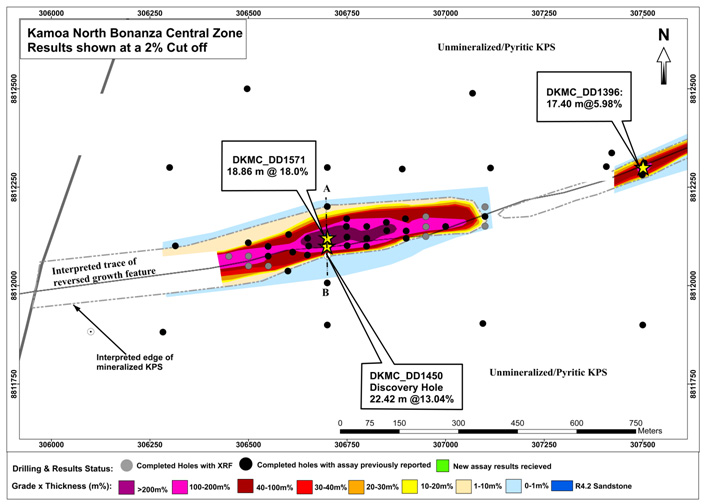
Figure 2: David Edwards, Geology Manager (far left), and members of the Kamoa-Kakula geology team highlight an intersection of 37.7% copper in drill core from hole DD1571.

Figure 3: Core from hole DD1571 at a depth of 211.8 metres, showing almost all cuprite (cuprite, Cu2O, is 88.82% copper by weight). Based on Niton readings, the average grade for the sample below is 37.7% copper.
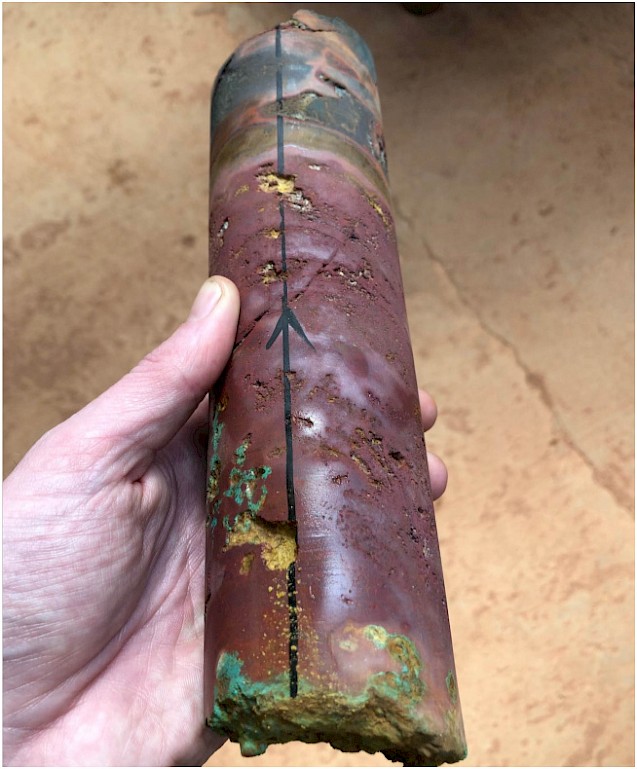
Figure 4: Core from hole DD1571 at a depth of 216 metres, showing massive bornite with traces of chalcopyrite.
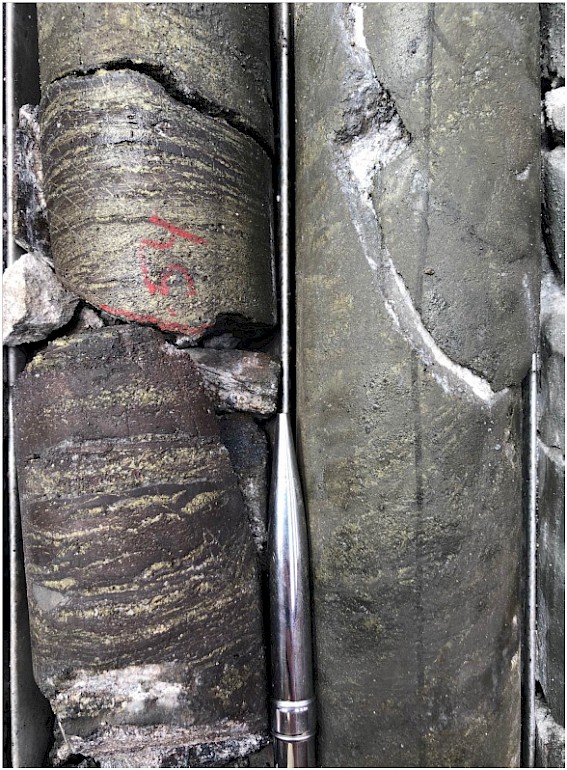
Figure 5: Core from hole DD1571 at a depth of 214 metres, showing disseminated chalcocite with a wide vein of native copper cutting through it in the breccia zone.
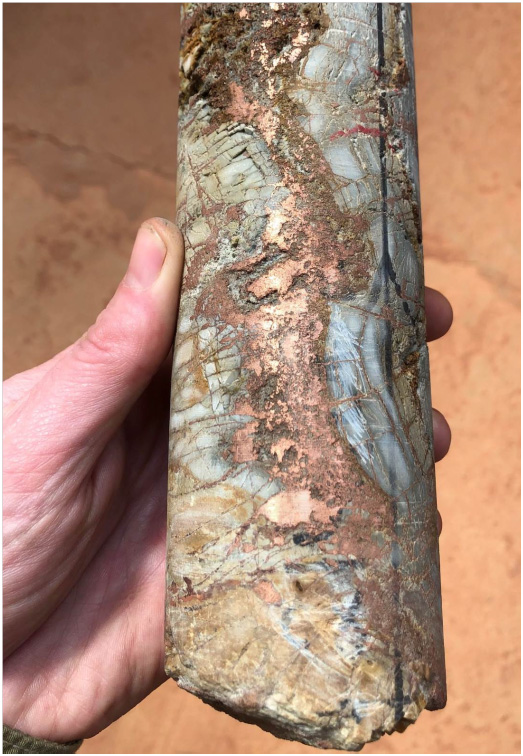
Figure 6: A north-south section view through the Kamoa North Bonanza Zone, showing copper grades in holes DD1450 and DD1571.
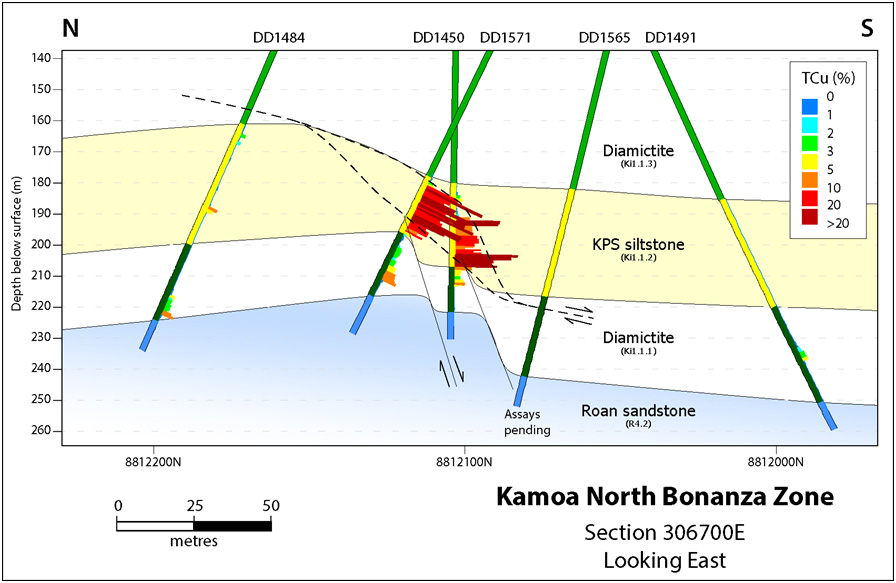
Figure 7: Copper grade profile of holes DD1450 and DD1571, showing dominant copper sulphide, copper assay values and composite grades at 1%, 2% and 5% copper cut-offs.
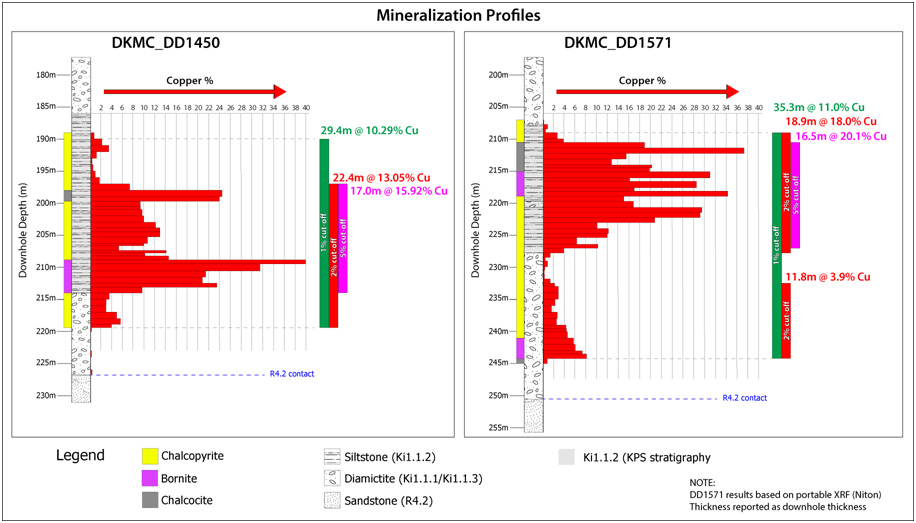
Ivanhoe to host the next site visit to its three African projects in October
Given the overwhelming interest in the exploration success at Kamoa-Kakula and Ivanhoe’s 100%-owned Western Foreland licences, and the development progress being made at the company’s three African projects, and in particular the rapid construction of the six million-tonne-per-annum stage-one Kakula Mine at the Kakula-Kamoa Copper Project, Ivanhoe Mines plans to host at least five investor and analyst site visits over the next eight months. The next investor site visit is scheduled for late October 2019.
“Everyone at Ivanhoe Mines looks forward to showcasing our three mine development projects − Kamoa-Kakula, Kipushi and Platreef − to investors from around the world in late October 2019. Those interested in attending our site visit should apply to our investor relations department as soon as possible,” said Mr. Friedland.
“The site visits also provide the opportunity for our sustainability teams to highlight the excellent community support programs and environmental initiatives that Ivanhoe and our joint-venture partners are undertaking to build our mines as showcases for responsible mine development.”
Qualified Person and Quality Control and Assurance
Scientific and technical information in this news release has been reviewed and approved by Stephen Torr, P.Geo., Ivanhoe Mines’ Vice President, Project Geology and Evaluation, a Qualified Person under the terms of National Instrument 43-101. Mr. Torr is not independent of Ivanhoe Mines. Mr. Torr has verified the technical data disclosed in this news release.
Ivanhoe conducts Niton (X-ray fluorescence or XRF) analyses routinely as part of its sample preparation and analysis. Sawn drill core is sampled on nominal 1-metre intervals, and then the sawn core is crushed to nominal 2 mm using jaw crushers. A quarter split (500 grams to 1,000 grams) is pulverized to >90% -75 μm, using LM2 puck and bowl pulverizes. The remaining coarse reject material is retained. A 100-gram split is sent for assay and a 30-gram split is used for used for XRF analysis. Ivanhoe inserts blanks and standards into the Niton XRF sample stream in the same way it does for its assays, with a 5% insertion rate for standards and blanks. Ivanhoe monitors the XRF results for accuracy and precision, although results are used for indicative purposes only.
Ivanhoe Mines maintains a comprehensive chain of custody and quality assurance and quality control (QA/QC) program on assays from its Kamoa-Kakula Copper Project. Half-sawn core is processed at the Kamoa-Kakula on-site preparation laboratory and prepared samples then are shipped by secure courier to Bureau Veritas Minerals (BVM) Laboratories in Australia, an ISO17025-accredited facility. Copper assays are determined at BVM by mixed-acid digestion with ICP finish. Industry-standard certified reference materials and blanks are inserted into the sample stream prior to dispatch to BVM. For detailed information about assay methods and data verification measures used to support the scientific and technical information, please refer to the March 2019 technical report titled “Kamoa-Kakula 2019 Integrated Development Plan”, on the Ivanhoe Mines SEDAR profile at www.sedar.com and available at www.ivanhoemines.com.
About Ivanhoe Mines
Ivanhoe Mines is a Canadian mining company focused on advancing its three principal projects in Southern Africa: the development of new mines at the Kamoa-Kakula copper discovery in the Democratic Republic of Congo (DRC) and the Platreef palladium-platinum-nickel-copper-gold discovery in South Africa; and the extensive redevelopment and upgrading of the historic Kipushi zinc-copper-germanium-silver mine, also in the DRC. The company also is exploring for new copper discoveries on its wholly-owned Western Foreland exploration licences, adjacent to the Kamoa-Kakula mining licence.
Information contacts
Investors:
Bill Trenaman +1.604.331.9834
Media:
Kimberly Lim +1.778.996.8510


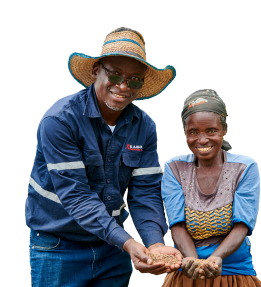
 English
English Français
Français 日本語
日本語 中文
中文